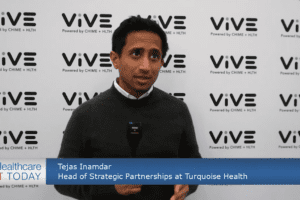Healthcare currently places a significant burden on patients and clinicians. Patients must explain their situation repeatedly to strangers who only have a few minutes for them and hope that they believe them enough to help them navigate the healthcare system. Clinicians are working under extreme pressure, and without sufficient infrastructure support. Dr. Alika Lafontaine, the President of the Canadian Medical Association (CMA) is looking to change that and make culturally safe care the norm for all.
Healthcare IT Today had the opportunity to catch up with Dr. Lafontaine at the 2023 Collision Conference held in Toronto. We asked him about the various initiatives that he is championing through the CMA, including implementing culturally safe care.
Helping People Get the Care They Need
In a fireside chat earlier this year on the state of indigenous health, Dr. Lafontaine explained culturally safe care this way:
Health care providers hold a lot of power, but that is something that is given, not earned. Cultural safety is using that power to help people get what they need. Cultural safety is the act of treating the person across from you as human, respecting their lived experiences, and behaving with the absence of hostility.
High Burden on Patients
At Collision 2023, Dr. Lafontaine pointed to the plight of patients as evidence that we do not yet have a culturally safe healthcare system. Indigenous patients, patients of color, elderly patients, women, patients with low socioeconomic status, etc. are not treated with the same deference or trust compared to patients who are viewed as “the norm”.
In these cases, there is a high burden on patients who must now convince the clinician of their illness or medical need.
Dr. Lafontaine is optimistic that we can move towards culturally safe care and is working to:
- Improve training for clinicians
- Increase health literacy
- Create better working conditions for clinicians
- Increase access to care
Better Working Conditions for Clinicians
Dr. Lafontaine stressed the importance of improving working conditions in healthcare as a key factor to providing better care to patients.
“We need to create a healthcare system so that clinicians are not working 80 hours a week when everyone else is working 40,” stated Dr. Lafontaine. “We can’t expect family physicians to take paperwork home. We have structured our healthcare system in a way that puts a lot of weight on a single person’s shoulders.”
This is where Dr. Lafontaine sees technology helping. Software, when properly designed and implemented, can help reduce the administrative burden on clinicians and streamline workflows. The downstream impact is a more pleasant work environment and one where clinicians may feel more connected with their patients.
Ultimately, this will lead to a healthcare system that is culturally safe for everyone.
Watch the interview with Dr. Alika Lafontaine to hear:
- How connection is key to culturally safe care
- Why we need to change the way we train clinicians
- How something as simple as a lounge can lead to better care
Learn more about the Canadian Medical Association at https://www.cma.ca/
Listen and subscribe to the Healthcare IT Today Interviews Podcast to hear all the latest insights from experts in healthcare IT.
And for an exclusive look at our top stories, subscribe to our newsletter.
Tell us what you think. Contact us here or on Twitter at @hcitoday. And if you’re interested in advertising with us, check out our various advertising packages and request our Media Kit.













